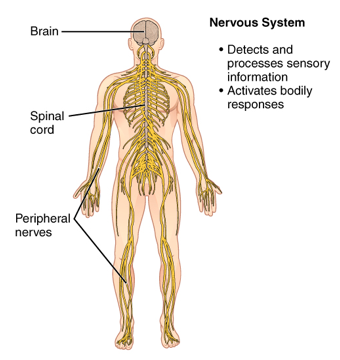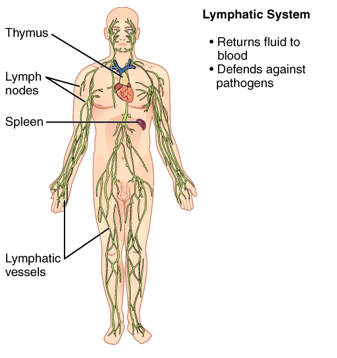Table of Contents |
Life is organized into various levels: atoms (the basic unit of all matter/chemicals) compose molecules, which compose cells (the basic unit of life), which compose tissues, which then will compose organs, which make up organ systems. Finally, organ systems make up organisms.
Below is a diagram that shows an illustration of the 11 human organ systems discussed in this lesson.

This system is basically made up of the outer layer (upper body) of your skin. The purpose of the integumentary system is the protection of your body. It also helps to regulate your temperature and receive sensory information.

The main role of your nervous system is to detect stimulation in your environment and then control responses to react to that stimulus.

Your muscular system basically coordinates your movements. It allows for your body to be able to move, and it helps to generate heat for your body to maintain a constant internal temperature; this helps to maintain homeostasis.

Your skeletal system works in conjunction with your muscular system to allow for movement and gives your body its shape. It supports your body by protecting internal organs and also stores minerals. Another important function of the skeletal system is that it makes red blood cells.
EXAMPLE
Different minerals, like calcium, are stored within your skeletal system.
Your cardiovascular system is another important body system because its main role is to transport blood and other materials throughout your body. Blood is what carries oxygen and other important materials to the tissues in your body. It also helps dispose of carbon dioxide waste.

The main purpose of the endocrine system is to control your body function with the use of hormones. It produces and secretes hormones that help control different bodily functions.

The purpose of the lymphatic system is to collect tissue fluids and then return them to the blood. It plays a role in your immune system in protecting your body from different invaders.

The main role of your respiratory system is to deliver oxygen to your different body tissues and help remove carbon dioxide waste.

The purpose of your digestive system is to ingest and then break down and process foods or liquids that you take into your body. It helps you to intake foods and liquids, digest them, process them, and then get the nutrients from them that you need.

The job of your urinary system is to control the volume and composition of blood. It also acts to excrete extra fluids or waste from our body that you don't need.

All of the other body systems are the same for males and females, but the reproductive system varies between the two. Males and females have different reproductive systems, but the basic purpose of the reproductive system is to develop a fetus.

Source: THIS WORK IS ADAPTED FROM SOPHIA AUTHOR AMANDA SODERLIND